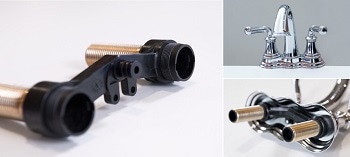Jun 3 2016
Royal DSM, a global science-based company active in health, nutrition and materials, is taking its EcoPaXX® polyamide into an important new market - drinking water contact applications. Use of this material offers a high-performance, lead-free option for applications such as faucet mixing valves.

The water management market is looking for high-performance polymers that are able to withstand the stringent requirements of hot-water contact, while still meeting all major drinking water approval schemes.
Legislation also has been driving replacement of metals in applications that involve direct contact with drinking water. Brass and other metals traditionally have been used for such applications as faucets, water-meter and boiler components. Lead contamination in drinking water is a major concern worldwide, leading to more stringent regulation on lead limits in drinking water. This has driven the industry to look for alternatives, and engineering plastics such as EcoPaXX offer a completely lead-free solution, and fully comply with those regulations.
Leading industry players already are successfully using EcoPaXX Q-DWX10, a 50% glass-fiber-reinforced polyamide 410, for faucet mixing valves because of its outstanding performance. This material enables the design of faucet mixing valves with lower risk of part failure and water leakage, a key focus for the industry.
Faucet mixing valves need to provide long-term durability and perform reliably when in contact with both warm (60oC) and hot water (90oC). EcoPaXX offers superior toughness, better hydrolysis resistance and dimensional stability than other polyamide-based materials. It not only is lead-free, but also yields improved torque and bending strength, even after extended exposure to boiling water. EcoPaXX absorbs 30% less water and offers superior chemical resistance, which is especially important when in contact with chlorinated water. It has passed more than 1 million lifetime cycles testing in varying water temperatures, and fully complies with all major drinking water certifications, such as NSF61 and KTW.
Externally validated by international lifecycle assessment experts, EcoPaXX base polymer is carbon-neutral from cradle to gate. Compared to polyphthalamide (PPA) resins with similar function, EcoPaXX compounds offer a 30% lower carbon footprint. Additionally, the material shows excellent flow and processability, resulting in high weld-line strength, and can be processed like any other standard polyamide material.
Having recognized this trend, DSM is further extending its portfolio of specialty materials suitable for addressing the full spectrum of drinking water contact uses. The company already offers EcoPaXX and ForTii™ -- inherently hydrolysis-resistant grades that are based on polyamides 410 and 4T, respectively. It also recently added Xytron™ PPS compounds, which are ideal when very high dimensional stability is needed.
With the successful commercialization of EcoPaXX polyamide 410 in faucet mixing valves, DSM has proven its ability to offer solutions for highly critical drinking water contact applications.
Caroline Mitterlehner, business responsible for the water management segment at DSM
“DSM is already active in many high-heat and water-contact applications in other industries, such as cooling-systems in automotive. We are now successfully translating this competence of resistance to hydrolytic environments into the drinking water contact market, where temperatures are lower, but required lifetimes are typically much longer.”